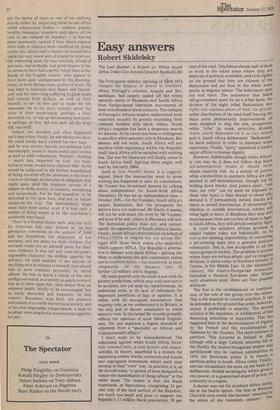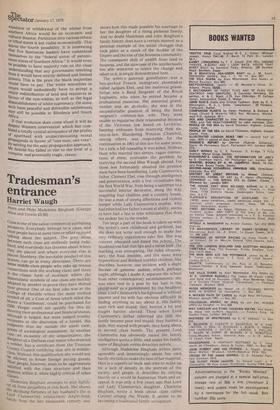Easy answers
Robert Skidelsky
The Last Bunker; A Report on White South Africa Today Guy Arnold (Quartet Books E5.50)
The Portuguese military uprising of Aril 1974 changed the balance of power in southern Africa. Portugal's colonies, Angola and Mozambique, had largely sealed off the white minority states of Rhodesia and South Africa from foreign-based liberation movements of their own dissident black subjects. The collapse of Portugal's African empire undermined both countries' security by greatly extending their common borders with black Africa. South Africa's response has been a desperate search for detente. At its centre has been a willingness to sacrifice white minority rule in Rhodesia. But detente will not work. South Africa will not sacrifice white supremacy within the Republic itself; black Africa will be satisfied with nothing less. The war for liberation will finally come to South Africa itself: fighting there might well start by the early 1980s.
Such is Guy Arnold's thesis. It is cogently argued. Since the manuscript went to press nothing has happened to alter its conclusions. Mr Vorster has broadened detente by talking about independence for South-West Africa (Namibia). He has set an independence date — October 1976 — for the Transkei, South Africa's largest Bantustan. But the prospects for detente have not improved. Mr Smith, it seems, will not be sold down the river by Mr Vorster; and even if he will, others in Rhodesia will not. The Bantustan policy does not, and cannot, satisfy the aspirations of South Africa's blacks.. Finally, South Africa's intervention on behalf of FNLA-UNITA in Angola has cut across dialogue with those black states (the majority) which support MPLA. The Republic's alternative to detente with black Africa — getting the West to underwrite the anti-communist status quo in southern Africa — has foundered, at least temporarily, on the Senate's veto of further US military aid to Angola.
My main quarrel with the book is not with its gloomy predictions, which may well turn out to be accurate, nor yet with its repetitiveness, its pedestrian style, or its lack of references for important assertions of fact or opinion. It is rather with its unargued assumption that majority rule, as we understand it in Britain, is the only just or decent alternative to white minority rule. In this belief Mr Arnold probably reflects the opinions of most liberal Englishmen. Yet one expected a higher standard of argument from a "specialist on African and Commonwealth affairs."
I don't want to be misunderstood. The indictment against white South Africa, forcefully restated here, is well known and unanswerable. In theory, apartheid is a system for separating whites, blacks, coloureds and Asians into segregated homelands where each may develop in their "own" way. In practice, it is, as Mr Arnold notes, "a system of laws designed to ensure the maintenance of cheap labour" in the white areas. The reason is that the black homelands, or Bantustans, comprising 14 per cent only of the land surface of the Republic, are much too small and poor to support the Republic's 17 mipion black population, 70 per
cent of the total. This forces almost half of them to work in the white areas where they are deprived of political, economic, and civil, rights, on the ground that they are citizens of the Bantustans and are thus in the white areas purely as migrant labour. The indictment does not end there. The insistence that black self-government must be on a tribal basis, the division of the eight tribal Bantustans into eighty-One separate pieces of land, the grosslY unfair distribution of the land itself leaving the black areas permanently impoverished, all seem designed to ring the one, prosperous, white "tribe" by weak, primitive, divided, states, utterly dependent on it: as Guy Arnold puts it, South Africa deliberately "Balkanises" its black subjects in order to maintain white supremacy. Finally, "petty" apartheid is itself a major affront to human dignity. However, indefensible though white minority rule may be, it does not follow that black self-determination means or should mean simple majority rule. As a matter of justice, white communities in southern Africa are also entitled to self-determination, though not by holding down blacks. And justice apart, "one man, one vote" can no more be imposed on those who reject it than denied to those who demand it. If permanently denied, blacks will resort to armed insurrection. If threatened by rebellion, or outside intervention, whites Will either fight or leave. In Rhodesia they may well
• leave because there are too few of them to fight; in South Africa, they will almost certainly figh:t.
In truth the southern African problem is unique neither today nor historically. At .its core is the seeming impossibility of converting a pre-existing state into a genuine political community: that is, one acceptable to all the major groups in society. The problem is acutest where there are serious ethnic and/or religious divisions. It exists today in Northern Ireland, in Cyprus, in the Middle East. In the nineteenth century, the Austro-Hungarian monarchY furnished a classical European case. Where such situations exist, there are four possible solutions.
The first is the establishment or continuation, of the rule of one group over the others. This is the imperial or colonial solutiion. It can be defended on the ground that order, however, unjust, is preferable to anarchy. The second solution is the expulsion, or withdrawal, of the dissenting minorities or majorities. This has happened both in the decolonisation of Algeria by the French and the recolonisation Palestine by the Zionists. The third solution is partition. This occurred in Ireland in 1922 (though with a large Catholic minority left in the North); the Austro-Hungarian empire was partititioned into its various nationalities in 1918; the Bantustan policy is in theory a partition policy in South Africa todaY. FinallY, one can reconstitute the state on the basis of a deliberately divided sovereignty which gives a veto power, or a guaranteed share of power, to a minority or a region.
A decent way out for southern Africa surelY lies in the fourth option. The first as Winston Churchill once noted, has become "unsuited_teo the ethics of the twentieth century' • Th
exPolsion or withdrawal of the whites from southern Africa would be an economic and cultural disaster. Partitition into various ethnic .or tribal states is not viable economically. This leaves the fourth possibility. It is interesting that five Bantustan leaders have committed themselves to the "federal union of autonoIlifts states of Southern Africa." It would even be Possible to have majority rule on the clear understanding that any government resulting from it would have strictly defined and limited Powers. This is the price the black majorities would have to pay. The white minorities in return would undoubtedly have to accept a Major redistribution of land and resources in favour of the non-whites, as well as the legal disestablishment of white supremacy. On some such basis peaceful and defensible settlement& may still be possible in Rhodesia and South Africa.
If that evolution does come about it will be despite Western intervention which has combined a totally cynical acceptance of the profits Of apartheid with undiscriminating moral Propaganda in favour of "one man, one vote". BY settling for the easy propagandist approach, Mr Arnold has failed to rise to the level of a complex, and potentially tragic, theme.
rellereare



























 Previous page
Previous page